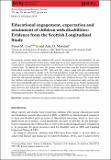Files in this item
Educational engagement, expectation and attainment of children with disabilities : evidence from the Scottish Longitudinal Study
Item metadata
| dc.contributor.author | Cox, Fiona McLean | |
| dc.contributor.author | Marshall, Alan David | |
| dc.date.accessioned | 2019-09-11T14:30:07Z | |
| dc.date.available | 2019-09-11T14:30:07Z | |
| dc.date.issued | 2019-09-11 | |
| dc.identifier | 260558899 | |
| dc.identifier | 23a91c39-d405-4b6a-ab11-d8bb6d1e3eff | |
| dc.identifier | 85072183273 | |
| dc.identifier | 000486949200001 | |
| dc.identifier.citation | Cox , F M & Marshall , A D 2019 , ' Educational engagement, expectation and attainment of children with disabilities : evidence from the Scottish Longitudinal Study ' , British Educational Research Journal , vol. Early View . https://doi.org/10.1002/berj.3576 | en |
| dc.identifier.issn | 0141-1926 | |
| dc.identifier.other | ORCID: /0000-0001-9745-9018/work/61622181 | |
| dc.identifier.uri | https://hdl.handle.net/10023/18464 | |
| dc.description | Funding: UK Economic and Social Research Council (ESRC) funded Census and Administrative data LongitudinaL Studies Hub (CALLS Hub) project (ref ES/K000446/1). | en |
| dc.description.abstract | Government statistics show that children with special educational needs and disabilities do not achieve as well academically as their peers, which impacts on later employment and socioeconomic circumstances. Addressing these inequalities is a key policy area which currently lacks a satisfactory evidence base. To explore the issue, the present study used data from the Scottish Longitudinal Study which contains data from the 1991, 2001 and 2011 censuses along with other administrative data, from a representative sample of the Scottish population. Using this large and longitudinal sample, the present study examines educational engagement, expectations and attainment for children with self-reported disability, controlling for other early childhood factors. The results show that children with mental health problems were at higher risk of leaving school early, and that children with learning difficulties were less likely to gain advanced qualifications. Neither limiting long-term illness in early childhood or disability in adolescence were significant predictors of engagement, however they did predict measures of academic expectation and attainment. Results suggest there is a critical phase for attainment, with area deprivation in early childhood but not adolescence being important for later educational inequalities. | |
| dc.format.extent | 1446454 | |
| dc.language.iso | eng | |
| dc.relation.ispartof | British Educational Research Journal | en |
| dc.subject | Disability | en |
| dc.subject | Education | en |
| dc.subject | Health inequalities | en |
| dc.subject | Mental health | en |
| dc.subject | LB Theory and practice of education | en |
| dc.subject | RA0421 Public health. Hygiene. Preventive Medicine | en |
| dc.subject | RJ Pediatrics | en |
| dc.subject | NDAS | en |
| dc.subject | SDG 3 - Good Health and Well-being | en |
| dc.subject.lcc | LB | en |
| dc.subject.lcc | RA0421 | en |
| dc.subject.lcc | RJ | en |
| dc.title | Educational engagement, expectation and attainment of children with disabilities : evidence from the Scottish Longitudinal Study | en |
| dc.type | Journal article | en |
| dc.contributor.sponsor | Economic & Social Research Council | en |
| dc.contributor.institution | University of St Andrews. School of Medicine | en |
| dc.identifier.doi | https://doi.org/10.1002/berj.3576 | |
| dc.description.status | Peer reviewed | en |
| dc.identifier.grantnumber | ES/K000446/1 | en |
This item appears in the following Collection(s)
Items in the St Andrews Research Repository are protected by copyright, with all rights reserved, unless otherwise indicated.

